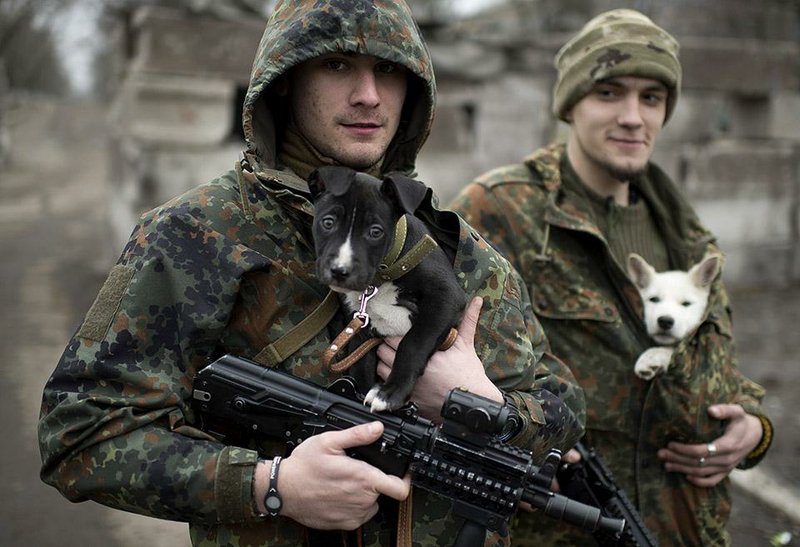KIEV, Ukraine -- The United States said it's ready to intensify pressure against Russia for supporting rebels who have stepped up attacks on Ukrainian troops as the European Union tussled over new sanctions in the face of opposition from Greece.
EU states will discuss adding names to, and extending the duration of, a black list of Russian and separatist individuals and companies linked to the conflict at a meeting of the bloc's foreign ministers today. U.S. Treasury Secretary Jacob Lew said President Barack Obama's administration was prepared to raise pressure on Russia to use its influence over the separatists to stop the conflict.
"Our first choice is a diplomatic resolution that allows us to lessen sanctions, but we remain prepared to do more if necessary," Lew told reporters Wednesday after meeting Ukrainian Finance Minister Natalie Jaresko in Kiev. "We will continue to work with our allies to increase the pressure on Russia."
The rebels renewed attacks last week along a broad front that stretches across Ukraine's Donetsk and Luhansk regions to the Sea of Azov, causing a spike in the death toll for the conflict that the United Nations estimates at more than 5,000. The U.S. and NATO accuse Russian President Vladimir Putin's government of taking part in the campaign by sending thousands of troops and scores of armored vehicles and other weapons across its border. Putin says Russia isn't involved.
The EU and U.S. are considering additional sanctions against Russia in technology, energy, defense and banking.
EU government representatives failed to agree Wednesday on a proposed six-month extension of travel bans and asset freezes on Russian politicians and military figures due to expire in March, three officials with knowledge of the talks said. Consensus was also elusive on a proposal to add names to the list and prepare further economic measures.
The bloc's foreign ministers will consider the package in Brussels today at the first EU meeting at which Greece is represented by its new Syriza-led government, which has questioned deepening sanctions against Russia. Sanctions require unanimity, giving Greece veto power.
German Vice Chancellor Sigmar Gabriel told ZDF television it's "premature to start calling for further sanctions" on Russia, according to a summary of the interview on the broadcaster's website.
Gabriel, who's also economy minister, heads the Social Democratic Party, Chancellor Angela Merkel's junior coalition partner. Merkel backed economic sanctions on Russia over the complaints of Germany's business community. She hasn't said publicly whether she favors further steps.
The clashes in Ukraine escalated this month to the worst since a September cease-fire, increasing tensions between Russia and its former Cold War foes and drawing criticism from U.N. Secretary-General Ban Ki-moon, who denounced a "unilateral withdrawal from the cease-fire by rebel leadership" last week.
On Saturday, more than 30 civilians were killed and more than 100 were wounded in the port city of Mariupol by rockets that the U.S., NATO and the Organization for Security and Cooperation in Europe said came from rebel-held territory.
Rebels blamed Ukrainian troops for the attack and said Ukraine isn't adhering to the September cease-fire agreement. The leadership of the Donetsk separatists is ready to continue talks, news service RIA Novosti cited Eduard Basurin, deputy commander of the Donetsk rebel headquarters, as saying Wednesday. Putin's government said the authorities in Kiev were undermining efforts to stop the violence.
"Fighting instigated by Kiev yet again leads toward further inevitable escalation of the conflict, undermines efforts taken by the international community to stop the bloodshed and seek a political solution to the Ukraine crisis," the Foreign Ministry said on its website.
Rebels attacked at least 25 villages and towns Wednesday, some with multiple rocket launch systems, Ukraine's Security and Defense Council said on Facebook. Three Ukrainian servicemen were killed and 15 wounded in overnight fighting in the nation's easternmost regions, the military said.
Ukraine is trying to stabilize its economy, which the government predicts will shrink 4.3 percent this year after contracting 7.5 percent in 2014.
It's in talks to expand a $17 billion International Monetary Fund bailout and is planning to approach holders of its sovereign bonds to try to negotiate more favorable borrowing terms, Finance Minister Natalie Jaresko said Jan. 22 in Davos, Switzerland. Ukraine needs $15 billion on top of the previous IMF bailout to stay afloat, according to the EU.
Lew reiterated plans for as much as $2 billion in U.S. loan guarantees, in addition to $1 billion granted last year. He said the U.S. is committed to a $1 billion loan guarantee in the first half of the year to help finance social spending, with an additional $1 billion contingent on Ukraine revamping its economy.
Information for this article was contributed by David Malingha Doya of Bloomberg News.
A Section on 01/29/2015



